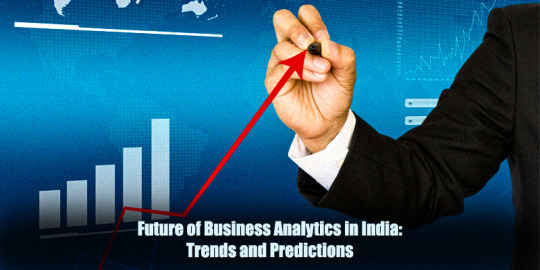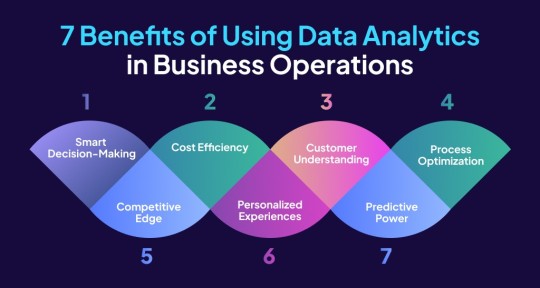#future of business analytics
Explore tagged Tumblr posts
Text

#business analytics#pgdm in business analytics#business analytics in india#career in business analytics#career in pgdm business analytics#pgdm business analytics career#business analytics career#future of business analytics#future of business analytics in india#Globsyn Business School#GlobsynBusinessSchool#GBS#Globsyn#GBS Kolkata#gbskolkata
2 notes
·
View notes
Text
Embracing a New Era: The Rise of Augmented Analytics.
Sanjay Kumar Mohindroo Sanjay Kumar Mohindroo. skm.stayingalive.in Augmented Analytics simplifies complex datasets with AI-driven insights that empower business decisions through clear and actionable data interpretation. Augmented analytics transforms data interpretation by using AI-driven systems that simplify the process of turning vast data collections into clear, actionable insights for…
#Actionable Insights#AI#AI Business Applications#AI in Business Strategy#AI in Global Operations#AI-Driven Analytics#AI-Powered Business Growth#Analytics for Business Leaders#Augmented Analytics#business#Business Transformation#Clear Data Insights#Clear Data Narratives#Continuous Improvement with Analytics#Data Clarity#Data Interpretation#Data Simplification#Data-Driven Culture#data-driven decision making#digital-marketing#Empowering Decision Makers#Future of Business Analytics#Global Business Strategy with AI#marketing#Modern Business Intelligence#Predictive Analytics#Real-Time Data Insights#Sanjay Kumar Mohindroo#Simplifying Complex Data#Strategic Business Insights
0 notes
Text
I’m not sure when exactly this happened, but I think it’s clear that the aro community really is a community, now.
For the longest time I’ve felt like we were still in stasis, not quite there; a proto-community, yes, but not quite a community. But we have more history now to lean back on, more of each other to talk to and laugh with and cry with and learn from. More people that’ll go forward and make a part of modern aro history. More people that believe us, believe in us, will stand with us if we ask them.
I wouldn’t consider myself an aro elder yet, though each year I’m surprised at how long aromanticism has been a part of my life, how long I’ve been free of doubt or insecurity about my aromanticism, how far we’ve come since I was questioning. Then again, when I was questioning, some of the people I looked up to for guidance were probably close to the age I am now, so I might be there sooner than I think.
And, I’m so so hopeful for all aros, young or old, new or not, because we’ve come so far. Day by day, progress is slow (and yes, it’s unfair, it should be so much faster), but looking back it feels fast. We are our own role models, the people we look up to for guidance. We carve our own path through life, making things up as we go. I used to find that terrifying, because I had no idea what the future would bring. But it’s actually amazing, because I can ignore all these silly “rules” and guidelines about what my life should be, and instead ask, “what do I want my life to be?”
Younger me, you have no idea how awesome your future is gonna be. I’m sorry about the pain and hardship you’ll go through first; it won’t be fair and you shouldn’t have to deal with it. But you’ll make it through, and one day you’ll be me. I can’t wait for you to get here.
#aromantic#aro#aspec#queer#lgbtq#original#text#can't believe i was busy on a day when aromantic got super trending#also on the topic of history: history is super important and we should make sure we're good custodians of it!#make backups of your tumblr blogs/wordpress sites/fanfiction/analytical essays/whatever!#save links into the internet archive/wayback machine!#future aros will thank us for every thing we save from link rot#current aros will thank us for keeping our resources alive and accessible
1K notes
·
View notes
Text
How DeepSeek AI Revolutionizes Data Analysis
1. Introduction: The Data Analysis Crisis and AI’s Role2. What Is DeepSeek AI?3. Key Features of DeepSeek AI for Data Analysis4. How DeepSeek AI Outperforms Traditional Tools5. Real-World Applications Across Industries6. Step-by-Step: Implementing DeepSeek AI in Your Workflow7. FAQs About DeepSeek AI8. Conclusion 1. Introduction: The Data Analysis Crisis and AI’s Role Businesses today generate…
#AI automation trends#AI data analysis#AI for finance#AI in healthcare#AI-driven business intelligence#big data solutions#business intelligence trends#data-driven decisions#DeepSeek AI#ethical AI#ethical AI compliance#Future of AI#generative AI tools#machine learning applications#predictive modeling 2024#real-time analytics#retail AI optimization
3 notes
·
View notes
Note
for the bttf asks: 😊🎵🖋️🕰️
thank you for the ask my dear friend!!
😊if you could be best friends with one of the characters, who would you choose and why?
I think we all know it would be Doc. Aside from my desperate desire for father figures Those who know me know that I’m very much a science person and that I get up to wild things all the time (like that one time I created a low-powered taser out of items in my purse…or when I built a morse code machine…or all of the chemistry experiments I do in my spare time…I could go on…) and I feel like Doc would not only appreciate that but that we’d have some great project feedback energy. Fluid dynamics (rather than the physics of standard motion or quantum physics) was always my strong suit in the realm of physics, but I was always good at chemistry, and at the very least musical!Doc mentions that chemistry isn’t his strong suit, so that would be a fun little pairing (although of course anything that isn’t Doc’s ‘strong suit’ is still probably leaps and bounds better than the average person). I’m rambling at this point but the summary here is that I think we’d bounce well off each other intellectually and our personalities aren’t super far from each other. I think any of my friends can vouch for the fact that I have a very similar manic energy when I’m in the throes of it y’know?
🎵if you have listened to the musical soundtrack, which song is your favorite and why?
I have not only listened to it but seen it live (four times now! don’t start me on the fact that they’re closing on Broadway I will cry). It’s incredibly difficult to pick a favorite song, so I’ll narrow the criteria a little bit—my favorite song to listen to is different than my favorite song to sing! My favorite song to listen to is probably It Works, but part of that is because I love Doc so much (admittedly it’s also because I laugh when I think about Roger almost ‘falling’ off of the DeLorean when he tries to climb up on it). The ‘who are the girls?’ bit is one of my favorite parts of the show, and I’ll take a moment to talk about that. Back to the Future is a musical that knows it has solid comedic moments. It knows that it breaks some of the walls of normalcy, that it sometimes breaks the fourth wall, that it is built on a framework that allows for a bit of the ridiculous and the fun—and it takes that and embraces it, which is so important for a show like this. You have to be able to have fun with yourself, and know that there’s a little bit of ridiculousness going on, for it to work. I believe this is talked about a bit in the book on the creation of the musical, but it’s absolutely true; this is a show that knows what it is, and that is a major key to success not only in the formation/logic of a show but in connecting with your audience. I’ve now gotten very far away from the question oops My overarching point here is that the reason why the musical works (hah) is because of moments like in It Works, but it’s also just fun for me to put that on while I’m driving and pretend to do the choreo. While driving. The spirit’s there, anyhow,
(I enjoy singing Pretty Baby because I’m a filthy little soprano okay)
✒️you are hired to write/draw a new bttf comic, and it can be about whatever you want. what in the bttf universe would you want to expand on?
Aw man what a great question! Firstly, definitely write, we all know I cannot draw. Secondly. Wow. Okay. There’s a lot here to think about, and this makes me glad that I’ve actually read the comics. I would love to just see…some normal-ish stuff? I know that’s broad, but what I mean is that…I know it’s hard to have a storyline without stakes. You have to have something to push the plot along, to entice the reader, et cetera et cetera. That being said, I’d kind of love to just see Doc and Marty hanging out and being friends, y’know? I’d also love more about Doc’s childhood, or Doc and Clara things, but the friendship between Doc and Marty is so important to me, I’m always down for more of that!
🕰️if you were to insert yourself into the trilogy, what year would you come from?
Hahahaaaaa okay for me personally, the logical answer is the present (2024), but if I like…had the choice of what era I was from (I’m…assuming that’s what this means? I have low comprehension sometimes) that makes the choice a lot harder! I’m a fan of the 1920s and 1940s (the latter in a sense of “I have Jewish generational trauma” okay) but I’m also a massive history nerd and at least one of my alters would absolutely rock with being from like 1860. I think I’m too wild to come from any time earlier, I’d probably be labeled a witch or something. Kind of interested to see what era people would think I belong in, though?
#bestie you unlocked paragraphs and paragraphs from me#thank you so much for the ask!!#bttf ask game#bttf#alyssa speaks#asked and answered#bttf musical#back to the future#one of these days i need to make an actual post about my thoughts on the musical because i have like serious analytical thoughts#after all that’s the business/realm that i work in primarily!#doc brown please be my friend i’m (ab)normal and a polymath and also i bake
4 notes
·
View notes
Text
What is Digital Marketing ?
Digital marketing refers to the use of digital channels, platforms, and technologies to promote products, services, or brands to reach consumers. It encompasses a wide range of online marketing tactics and strategies.

Key components of digital marketing include:
Search Engine Optimization (SEO): Optimizing websites and content to rank higher in search engine results pages (SERPs).
Search Engine Marketing (SEM): Paid advertising to appear in search engine results, often through platforms like Google Ads.
Social Media Marketing: Promoting products or services on social media platforms like Facebook, Instagram, Twitter, etc., to increase brand awareness, engagement, and sales.
Content Marketing: Creating and distributing valuable, relevant content to attract and retain a target audience. This can include blog posts, videos, infographics, and more.
Email Marketing: Sending commercial messages to a group of people via email to promote products or services.
Influencer Marketing: Collaborating with influencers who have a dedicated and engaged following to promote products or services.
Affiliate Marketing: Partnering with other businesses or individuals who promote your products or services in exchange for a commission.
Online PR: Using digital channels to manage a company's reputation and build relationships with the media.
Analytics and Data-driven Marketing: Utilizing data analysis tools to measure marketing efforts and optimize strategies based on insights.

Digital marketing allows businesses to reach a global audience, target specific demographics, track and measure results in real-time, and adjust strategies based on performance data. It has become essential for modern businesses looking to grow their online presence and increase sales in a competitive digital landscape.
#digital marketing#online marketing#social media marketing#web analytics#marketing#business#future of marketing
4 notes
·
View notes
Text
🚨 Stop Believing the AI Hype, that’s the title of my latest conversation on the Localization Fireside Chat with none other than @Dr. Sidney Shapiro, Assistant Professor at the @Dillon School of Business, University of Lethbridge. We dive deep into what AI can actually do, and more importantly, what it can’t. From vibe coders and synthetic data to the real-world consequences of over-trusting black-box models, this episode is packed with insights for anyone navigating the fast-moving AI space. ���� Dr. Shapiro brings an academic lens and real-world practicality to an often-hyped conversation. If you're building, deploying, or just curious about AI, this is a must-read. 🎥 catch the full interview on YouTube: 👉 https://youtu.be/wsqN0964neM Would love your thoughts, are we putting too much faith in AI? #LocalizationFiresideChat #AIethics #DataScience #AIstrategy #GenerativeAI #MachineLearning #CanadianTech #HigherEd #Localization #TranslationTechnology #Podcast
#AI and Academia#AI Ethics#AI for Business#AI Hype#AI in Canada#AI Myths#AI Strategy#Artificial Intelligence#Canadian Podcast#Canadian Tech#chatgpt#Data Analytics#Data Science#Dr. Sidney Shapiro#Explainable AI#Future of AI#Generative AI#Localization Fireside Chat#Machine Learning#Robin Ayoub#Synthetic Data#Technology Trends
0 notes
Text
The Evolution of PGDM Curriculums: Adapting to Industry Trends and Demands

#Post Graduate Diploma in Management#Business management education#Bangalore business ecosystem#PGDM Specialization#PGDM Courses#Data analytics in business#Soft skills development#Future of PGDM education#Global perspectives in management
1 note
·
View note
Link
#Future of Business Analytics#business analytics#pgdm business analytics#PGDM in Business Analytics#GlobsynBusinessSchool
3 notes
·
View notes
Text
Wawasan Pelanggan Berbasis AI untuk Pemasaran yang Tepat Sasaran
Di era digital yang semakin kompleks, memahami pelanggan menjadi kunci keberhasilan pemasaran. Perusahaan yang dapat mengidentifikasi kebutuhan, preferensi, dan perilaku pelanggan memiliki keunggulan kompetitif yang signifikan. Namun, dengan jumlah data yang terus bertambah, menganalisis informasi secara manual menjadi tantangan besar. Di sinilah kecerdasan buatan (AI) memainkan peran penting. AI…
#AI in small businesses#AI marketing#AI-driven campaigns#customer insights#customer loyalty#data ethics#future of AI marketing#hyper-personalization#machine learning tools#marketing automation#omnichannel marketing#personalized marketing#predictive analytics#ROI improvement#sentiment analysis
0 notes
Text
The Future of Corporate Decision-Making: A New Era of Insights and Innovation

In today’s dynamic business landscape, decision-making is no longer confined to boardrooms filled with paper reports and subjective opinions. With the advent of advanced technologies, corporations are redefining how they approach strategic choices. The future of corporate decision-making lies at the intersection of data-driven insights, collaborative tools, and innovative strategies. Let’s explore how this transformation is unfolding and what it means for organizations worldwide.
The Role of Artificial Intelligence in Decision-Making
Artificial Intelligence (AI) is revolutionizing the decision-making process by offering unparalleled data analysis capabilities. Algorithms can process vast amounts of structured and unstructured data, identifying patterns and insights that humans might overlook.
For example:
Predictive analytics helps forecast market trends and consumer behavior.
Machine learning models refine decisions by learning from past outcomes.
Natural language processing (NLP) tools analyze customer feedback for actionable insights.
With AI, corporate leaders can make more informed and timely decisions, minimizing risks and maximizing opportunities.
The Rise of Collaborative Decision-Making Platforms
Gone are the days of isolated decision-making. Collaborative platforms powered by cloud technology are enabling teams to contribute their expertise in real-time. Tools like Slack, Microsoft Teams, and bespoke AI-driven platforms ensure that every stakeholder’s voice is heard, fostering inclusive and transparent decision-making processes.
Key benefits include:
Streamlined communication across departments.
Consolidated data visualization for a unified view of challenges.
Faster consensus building through shared digital workspaces.
Such platforms not only enhance efficiency but also ensure that decisions are aligned with organizational goals.
Data Democratization: Empowering Every Employee
The future of corporate decision-making emphasizes data accessibility for all employees, not just top executives. Data democratization ensures that insights are readily available to individuals across the hierarchy, empowering them to make informed choices in their respective roles.
How it’s achieved:
Implementing user-friendly business intelligence tools like Tableau or Power BI.
Offering training programs to build data literacy.
Establishing secure but accessible data governance frameworks.
This shift not only accelerates decision-making but also fosters a culture of accountability and innovation.
The Impact of Predictive Analytics and Big Data
Predictive analytics, fueled by Big Data, is a game-changer for businesses aiming to stay ahead in a competitive environment. By analyzing historical and real-time data, organizations can predict future outcomes with remarkable accuracy.
Applications include:
Optimizing supply chain operations by predicting disruptions.
Enhancing customer retention through personalized recommendations.
Identifying potential financial risks before they escalate.
These predictive capabilities enable businesses to be proactive rather than reactive, a critical factor in long-term success.
Ethical Considerations in Decision-Making
As technology takes center stage, ethical decision-making becomes increasingly vital. Organizations must ensure that their choices align with societal values and regulatory frameworks. Key considerations include:
Transparency in AI-driven decisions to avoid biases.
Prioritizing data privacy and security.
Incorporating sustainability metrics into corporate strategies.
By addressing these ethical challenges, companies can build trust with stakeholders and maintain their reputation in an increasingly scrutinized business environment.
Scenario Planning and Simulations
Future decision-making will heavily rely on advanced scenario planning and simulations. These tools allow businesses to evaluate potential outcomes of various strategies in a risk-free virtual environment.
For instance:
Retail companies can simulate demand fluctuations during peak seasons.
Manufacturers can test supply chain changes without real-world disruptions.
Financial institutions can model the impact of regulatory changes on their operations.
Such simulations provide a deeper understanding of complex systems, enabling organizations to make confident and resilient decisions.
The Integration of Human Intuition and Technology
While technology is a powerful enabler, human intuition remains an irreplaceable element in decision-making. The future lies in harmonizing these two forces:
AI provides the data-driven backbone, offering insights and recommendations.
Human leaders bring empathy, creativity, and ethical judgment to the table.
This symbiotic relationship ensures that decisions are not only efficient but also aligned with the organization’s mission and values.
Preparing for the Future: Building Decision-Making Resilience
To thrive in the future, organizations must build resilience into their decision-making processes. This involves:
Continuously updating technology stacks to incorporate the latest tools.
Cultivating a culture of adaptability and continuous learning.
Engaging in regular strategy reviews to align with evolving market dynamics.
By staying agile, businesses can navigate uncertainties and seize emerging opportunities with confidence.
Conclusion
The future of corporate decision-making is a dynamic blend of technology, collaboration, and human ingenuity. As AI, Big Data, and collaborative platforms redefine how organizations make choices, the emphasis will increasingly shift towards ethical, inclusive, and proactive strategies. By embracing these advancements, companies can ensure they remain competitive, innovative, and resilient in an ever-changing global marketplace.
#tagbin#writers on tumblr#artificial intelligence#technology#tagbin boardroomai#future of corporate decision-making#corporate innovation#AI-driven decision-making#digital transformation in business#future of business leadership#technology in decision-making#business analytics
0 notes
Text

Data analytics enhances business operations by providing valuable insights, optimizing processes, improving decision-making, and identifying trends. It helps predict customer behavior, reduce costs, and increase efficiency. By leveraging Business Data Analytics, businesses can make informed strategic decisions, improve performance, and gain a competitive edge in the market.
#data analytics#business success#data analysis#business operations#innovations#data integration#tech trends#future technology
0 notes
Text
How Artificial Intelligence is Transforming Scientific Research
Introduction No one ever imagined how artificial intelligence would revolutionize scientific research. At TechtoIO, we look into how AI is not just a tool but the driver behind the rapid advancements in many scientific disciplines. That includes how science is being transformed—from better data analysis to catalyzing discovery, such as areas in health, climate science, physics, particle experimentation, and more. Read to continue link...
#Science Explained#TagsAI accelerating discoveries#AI and environmental monitoring#AI bias mitigation#AI data analysis#AI data privacy#AI future advancements#AI in astronomy#AI in climate science#AI in genomics#AI in healthcare research#AI in material science#AI in social sciences#AI in space exploration#AI medical image analysis#AI predictive analytics#AI simulations in science#AI transforming science#AI-driven drug discovery#artificial intelligence in scientific research#ethical AI in research#analysis#nvidia drive#science updates#tech news#adobe cloud#business tech#trends#science#technology
0 notes
Text
“Business Adoption of AI Doubles in Five Years”
In a groundbreaking study by McKinsey’s QuantumBlack artificial intelligence division, it was revealed that business adoption of AI has more than doubled over the past half-decade. 🚀 Five years ago, only 20% of organizations reported using AI in at least one business area. Fast forward to today, and that figure stands at an impressive 50%! 📈 But that’s not all. The average number of AI…

View On WordPress
#AI Adoption#Business Transformation#Corporate Strategy#Data Analytics#Digital Innovation#Future of Work#Industry Insights#Machine Learning#Organizational Change#Technology Trends
0 notes
Text
In the dynamic world of modern business, data-driven decision-making has become a cornerstone of success. Companies that utilize the power of data analytics achieve a competitive edge by making informed choices based on insights obtained from vast amounts of information.
Among the myriad tools available for data analysis, predictive analytics software development stands out for its ability to unlock business growth by forecasting trends, identifying risks, and enabling proactive strategies.
#Predictive analytics for business growth#predictive analytics dashboard development#predictive analytics#predictive data analytics#predictive business analytics#big data predictive analytics#healthcare predictive analytics#predictive customer analytics#predictive analytics in health insurance#predictive analytics for healthcare#future of predictive analytics
0 notes
Text
Zendesk to Acquire Ultimate
Zendesk announced it will acquire Ultimate, an industry-leading provider of service automation, to deliver the most complete AI offering for customer experience (CX) in the market1. As unprecedented demand for AI drives up the speed and frequency of customer engagement, AI agents push beyond traditional bot capabilities to help brands transform CX into a competitive advantage. With Ultimate,…

View On WordPress
#acquisition#AI#AI agents#analytics#automation#autonomous#backend system#bot capabilities#business growth#chatbots#competitive advantage#control#cost-effectiveness#creativity#customer engagement#customer experience#customization#CX#Daniel Newman#efficiency#Excellence#Flexibility#Future#game changer#human agents#human touch#Hybrid#industry-leading#innovation#intelligence
0 notes